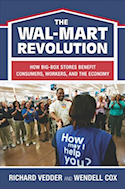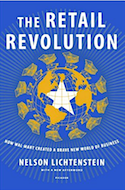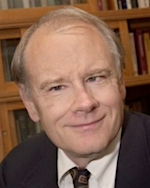Economic pluses and minuses of Walmart, world’s largest company with $485.8 billion in sales and 2.3 million employees, will be aired April 6 in New York.
 |
 |
Defending Walmart will be Richard Vedder, author of The Wal-Mart Revolution, and John Tierney, former New York Times columnist, while critics are Nelson Lichtenstein, author of The Retail Revolution: How Walmart Created a Brave New World of Business, and Amy Taub, researcher for Demos, liberal-oriented policy organization.
Demos, which had $7.42 million in revenues in 2015 and net assets of $4.05M, is based at 220 Fifth ave., New York. Heather McGhee is president. Taub explores consumer debt, job creation and the U.S. middle class for Demos, founded in 2001.
Walmart is an Edelman account.
|
|
Subtitle of Vedder's book is "How Big-Box Stores Benefit Consumers, Workers and the Economy." Tierney's column, "The Big City," appeared in the NYT magazine and the Metro section. His latest book is Willpower: Rediscovering the Greatest Human Strength, which was a NYT bestseller and was translated into 20 languages.
Hosting the event at the Kaufman Center, 129 W. 67th st., is Intelligence Squared U.S., the American branch of a debating society created in the U.K. in 2002.
It includes a reception from 5:45-6:30 p.m. and the debate from 6:45-8:30. Tickets are $40 from Intelligence Squared.
Students are $12.
Event Will be Live Online
The event will be streamed online, and viewers will be able to cast their votes on the proposition, “Long Live Walmart.”
 |
Vedder, Tierney and others say new Walmart stores boost employment and income in communities, especially benefitting the poor; that Walmart employees are paid fairly, and that very few do not have health insurance. They decry attempts by communities to penalize Walmart by enacting restrictive zoning laws, requiring health insurance or setting high minimum wages.
Walmart in January said it would create 10,000 new jobs in the U.S. this year.
Supporters say this is the latest example of Walmart benefitting America by providing jobs to low-skilled workers, selling affordable goods, and attracting new consumers and businesses to its neighborhoods.
Lichtenstein, Taub and other critics say Walmart hurts local communities by pushing out locally-owned businesses, provide low pay and “restrictive” work hours, and force U.S. companies to use cheap foreign labor.
Walmart has “spread evangelical Protestantism into the workplace, made South China an American workshop, and pushed U.S. politics to the right,” says Lichtenstein.
Demos Calls for “Equality”
The Demos mission statement says it is “a public policy organization working for an America where we all have an equal say in our democracy and an equal chance in our economy. Our name means ’the people.’ It is the root word of democracy, and it reminds us that in America, the true source of our greatness is the diversity of our people. Our nation’s highest challenge is to create a democracy that truly empowers people of all backgrounds so that we all have a say in setting the policies that shape opportunity and provide for our common future. To help America meet that challenge, Demos is working to reduce both political and economic inequality, deploying original research, advocacy, litigation, and strategic communications to create the America the people deserve.”
Debate Format Described
In the first round, each debater presents his or her uninterrupted opening statements, which are limited from two to 25 minutes for each speaker. The moderator then gives a summary of the points each side made and introduces the next round.
In the second round, debaters from each side may address each other directly. The moderator may or may not interrupt this exchange and will frequently ask questions of either side themselves.
In the third round, the audience is allowed to ask questions of the debaters. These are regulated by the moderator, who often rewords the questions for clarity and declines questions if they appear to be irrelevant to the motion.
In the fourth round, debaters present their uninterrupted closing statements, which, like opening statements, are limited by time and typically set anywhere from two to seven minutes for each speaker.
After the final round, a vote is taken of those in the live audience of their current (post-debate) opinion on the motion once again. Both the pre-debate and post-debate vote counts are then tallied and presented to the audience. The winner is determined by counting which side has changed the most audience members' minds.

 Richard Vedder
Richard Vedder
 Husch Blackwell Strategies has added FleishmanHillard alum Michael Slatin as a principal in its public affairs group.
Husch Blackwell Strategies has added FleishmanHillard alum Michael Slatin as a principal in its public affairs group. Rory Cooper, a veteran Republican operative and policy specialist, has joined Teneo’s Washington office as senior managing director in its strategy & communications practice.
Rory Cooper, a veteran Republican operative and policy specialist, has joined Teneo’s Washington office as senior managing director in its strategy & communications practice. Brian Fallon, who served as national press secretary for Hillary Clinton’s 2016 presidential run, is signing on next month as Vice President’s Kamala Harris’ campaign communications director.
Brian Fallon, who served as national press secretary for Hillary Clinton’s 2016 presidential run, is signing on next month as Vice President’s Kamala Harris’ campaign communications director. TikTok is nothing more than a Chinese propaganda tool that poses “a grave threat to America’s national security and, in particular, impressionable children and young adults,” say two Congressmen who want the platform registered as a foreign agent.
TikTok is nothing more than a Chinese propaganda tool that poses “a grave threat to America’s national security and, in particular, impressionable children and young adults,” say two Congressmen who want the platform registered as a foreign agent. Public Strategies Washington has added Abbie Sorrendino, a former aide to now Senate Majority Leader Chuck Schumer.
Public Strategies Washington has added Abbie Sorrendino, a former aide to now Senate Majority Leader Chuck Schumer.


 Have a comment? Send it to
Have a comment? Send it to 
No comments have been submitted for this story yet.